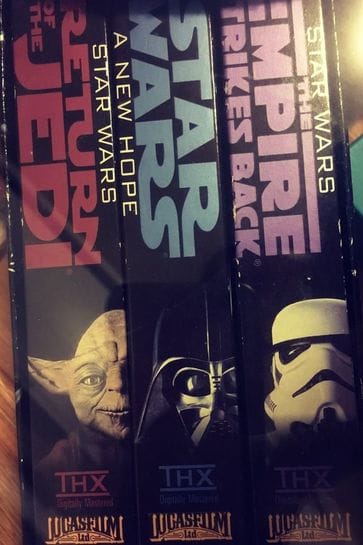 VHS: my first Star Wars format, but not my last. VHS: my first Star Wars format, but not my last. Stop me if you’ve heard this one before: this year marks the death of movies. No? How about the death of paper books? Of console video games? We have a strange and misplaced fascination with pronouncing the end of a particular media genre. As far as I can tell, we are generally bad at it. The articles lamenting (or hailing) the impending death of the movie demonstrate two interesting trends. The first is that movies as a medium will lose out to a new technology. The other suggestion is that the movie is “dead” because its content has become irrelevant and poorly thought out. Let’s address the technological one first. We have played this game before: movies will be the death of live theatre. Home video will be the death of movies. E-books will mean the death of paper books. All false. Yes, the market for consumption of these media forms has changed, but none of them have vanished. To suggest that they will fails to consider that they don’t do remotely the same thing. Movies can be amazing pieces of entertainment, but they do not provide the same experience, either for the actor or for the viewer, as live theatre does. The point is subtler but equally true of movies and television. Seeing a movie on a big screen is different than seeing it on a small one, and provides me with a different thrill than sitting on my couch; if it didn’t, I wouldn’t be lining up to see Rogue One in theatres. What about the replacement of home video rental for streaming services like Netflix, you say? Netflix didn’t replace a different medium; it replaced the same medium. The experience of watching a Netflix movie and watching a rented movie is not different. It’s just easier to get. We continue to hold onto a wide range of entertainment experiences, because they play on us in different ways. Live theatre is not inherently better than movies, just as movies are not inherently better than television; they are simply sufficiently different that they continue to hold onto their own domains of viewers. There are those who ignore the technological question, and lament instead that movies have fallen into a rut of producing terrible, lowest-common-denominator entertainment. The most glaring problem with this idea can be seen in comparison with another form of media: books. There are plenty of truly terrible books. Books that tell bad stories, or that tell good stories badly. Since the invention of the novel at the beginning of the 19th century, there have been piles of utterly terrible writing. The 19th century novel that you see reprinted today, the ones that we call “Classics,” are the good ones, selected over the course of time from amidst the waste of the terrible ones. In every format, it is possible to lack imagination and skill; it doesn’t destroy the format, it simply causes the bad examples of it to be forgotten. Movies aren’t dying, and movies as an industry are not the problem. Moviegoers can be selective with the movies that they see. Just as gamers can be with video games. Just as readers can be with books. Entertainment industries are shaped by their consumers, not the other way around. If you want quality stories, consume quality stories, in all their forms. That said, seeing a big explosive Hollywood blockbuster probably won’t do you any harm either. And it goes well with popcorn.
2 Comments
12/22/2016 05:17:38 am
I have read your article; it is very informative and helpful for me. I admire the valuable information you offer in your articles. Thanks for posting it.
Reply
Leave a Reply. |
Author
Jane Perrella. Teacher, writer. Expert knitter. Enthusiast of medieval swordplay, tea, Shakespeare, and Batman. Archives
June 2019
Categories |
 RSS Feed
RSS Feed
